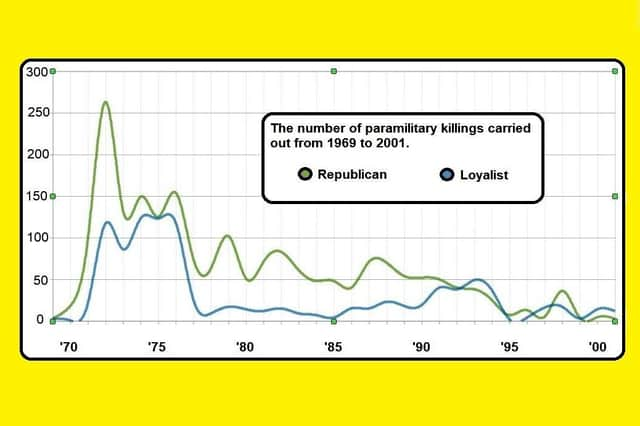Sean Graham Massacre & Troubles death toll: By the early ‘90s loyalists began to out-murder republicans for the first time


Up ‘til the early 1990s, republicans outstripped loyalists in terms of how many murders they were committing annually.
Advertisement
Hide AdAdvertisement
Hide AdBut by 1992, a combination of falling republican killings and rising loyalist ones meant the number of murders by each camp had more or less equalised.
With the IRA considering suing for peace as the security services infiltrated its ranks, in 1992 the number of republican murders stood at 40 for the year with loyalists claiming 38 lives.
In 1993, loyalists murdered 49 to republicans’ 38 victims, and in 1994 loyalists murdered 37 people compared with 25 killings by republicans.
After that, the tentative ceasefires which began in 1994 began suppressing the murder rate (although the IRA would break theirs in 1996, causing the death toll to shoot up once again).
Advertisement
Hide AdAdvertisement
Hide AdAll these statistics come from CAIN, the Ulster University Troubles project.
Looking at the whole Troubles from 1969 to 2001, CAIN records a total of 2,058 republican killings, 1,027 loyalist ones, and 365 by members of the security forces (with scores more unknown).
More from this reporter:
Advertisement
Hide AdAdvertisement
Hide Ad——— ———
A message from the Editor:
Thank you for reading this story on our website. While I have your attention, I also have an important request to make of you.
With the coronavirus lockdowns having had a major impact on many of our advertisers — and consequently the revenue we receive — we are more reliant than ever on you taking out a digital subscription.
Subscribe to newsletter.co.uk and enjoy unlimited access to the best Northern Ireland and UK news and information online and on our app. With a digital subscription, you can read more than 5 articles, see fewer ads, enjoy faster load times, and get access to exclusive newsletters and content.
Visit
now to sign up.
Advertisement
Hide AdAdvertisement
Hide AdOur journalism costs money and we rely on advertising, print and digital revenues to help to support them. By supporting us, we are able to support you in providing trusted, fact-checked content for this website.
Ben Lowry, Editor